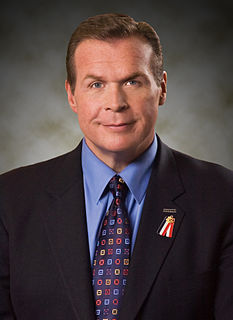A Quote by Kevin Sorenson
The Harper Government is committed to ensuring that seniors have the skills they need to make solid financial choices. Seniors today face an increasingly complex financial marketplace, and it will take the combined efforts of public and private sector organizations to help seniors navigate the many financial choices they face. The start of Financial Literacy Month is an excellent opportunity to thank the Canadian Bankers Association and encourage other private sector organizations to take an active role in providing financial literacy support to Canada's seniors.
Quote Topics
Active
Association
Bankers
Canada
Canadian
Choices
Combined
Combined Effort
Committed
Complex
Efforts
Encourage
Ensuring
Excellent
Face
Financial
Financial Literacy
Government
Harper
Help
Increasingly
Literacy
Make
Many
Marketplace
Month
Navigate
Need
Opportunity
Organizations
Other
Private
Private Sector
Providing
Public
Role
Sector
Seniors
Skills
Solid
Start
Support
Take
Thank
Today
Will
Related Quotes
Financial literacy is not an end in itself, but a step-by-step process. It begins in childhood and continues throughout a person's life all the way to retirement. Instilling the financial-literacy message in children is especially important, because they will carry it for the rest of their lives. The results of the survey are very encouraging, and we want to do our part to make sure all children develop and strengthen their financial-literacy skills.
That's the problem with the financial sector. Banks and the financial sector live in the short run, not the long run. In principle the government is supposed to make regulations that help the economy over time. But once it's taken over by the financial sector, the government lives in the short run too.
We don't invest in financial literacy in a meaningful way. We should be teaching elementary school children how to balance a checkbook, how to do basic accounting, why it's important to pay your bills on time. First, education. Begin the learning process as early as possible, in elementary school. Second, encourage and support entrepreneurism. Third, policy. I know it's a priority of the US Treasury to augment financial inclusion and increase financial literacy.
And if you like socialized medicine, you will love this government bureaucracy under [then-Vice President and Democratic presidential nominee] Al Gore that will actually cost seniors who get $500 a year in prescription drugs right now - it will end up costing seniors more money and take away control from those seniors.
We are all used to paying a sales tax when we buy things - almost 9 percent here in New York City. The application of this concept to the financial sector could solve our need for revenue, bring some sanity back into the financial sector, and give us a way to raise the revenue we need to run the government in a fiscally responsible way.
When large companies take on risk, then they impose risks on the rest of the system. And these are systemic risks and these systemic risks we never used to think were really that important, but as soon as we recognize how the financial sector - the risks the financial sector takes on can impact the entire global economy, we realize that those risks needed to be controlled for the social good.

































